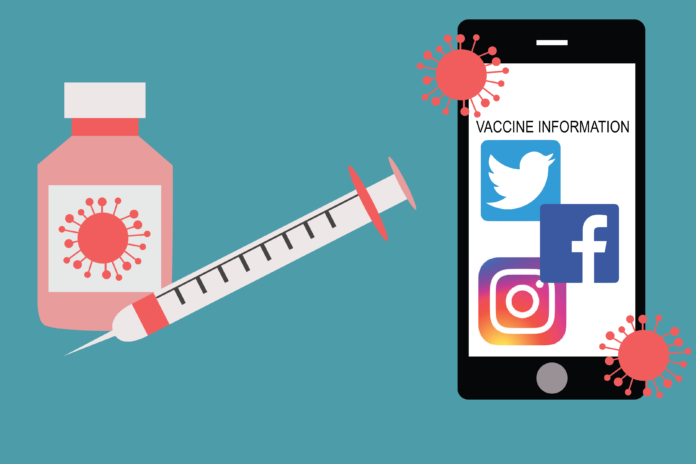Organized anti-vaccine groups are deliberately spreading misinformation, and social media companies are doing little to stop them
In the age of social media, knowledge has never been more easily accessible. However, just as information is available at the tip of your fingers, so is misinformation. With the seemingly endless wealth of information and misinformation, it can be difficult for people to decipher good information from bad. This can lead to people being misinformed on issues like vaccinations.
Despite the scientific evidence that COVID-19 vaccinations (along with preexisting Food and Drug Administration (FDA) approved vaccinations) are extremely safe and effective, a cursory search on the internet might lead anybody to believe otherwise. This misinformation often comes in two forms, according to Dr. Jingwen Zhang, an assistant professor of communication at UC Davis.
“Sometimes, average individuals can cast their own doubt and try to make some incorrect links between, for example, side effects or results and their own experiences related to vaccines,” Zhang said. “For example, we often see personal narratives of parents sharing how their children ‘became a different person’ after getting the MMR vaccine. This type of misinformation is misleading, it comes from one person’s experiences and is not really in line with scientific studies.”
Zhang noted that the second form is much more malignant, extending beyond an individual’s simple misunderstanding.
“The other type of misinformation is the more organized kind coming from groups that are trying to purposely misinform the public because they have this very broad anti-vaccine agenda,” Zhang said.
According to Zhang, these orchestrated anti-vaccine groups “have much more power.” They often employ the use of ‘bots’, fake accounts created to increase the spread of some information (in this case usually false narratives about vaccinations), according to Noah Stern, a fourth-year computer science major.
“They get bots to talk about it, post it and share it to make the [social media] algorithms think that the story is more popular than it is, causing it to appear higher in the search order,” Stern said.
Zhang added that social media companies are trying several different approaches to limit the spread of this misinformation, such as promoting reputable sources like the Centers for Disease Control and Prevention (CDC).
“For example on Instagram, if you search for ‘vaccine’ as a keyword, the first result is the official source of [the] CDC,” Zhang said. “That is one typical approach that the companies are preferring for now, because they don’t have to do a lot of checking, they just have to promote the good sources on top.”
While that minimizes the work social media companies do, it doesn’t completely limit users from seeing misinformation, according to Zhang.
“We observed that it’s not only these credible sources appearing on top of the page; in the same page you can see those posts from anti-vaccine groups appearing,” Zhang said. “They haven’t done any work to address this, because they have their concerns about limiting these groups who have a right to certain degrees of free expression.”
While it is nearly impossible for social media companies to catch everything that is posted on their sites, these sites are starting to do more to flag deliberate misinformation and link users where to find accurate information. Zhang’s recent study confirms that these fact-checking methods employed by social media companies can be effective at reducing the spread of misinformation.
As the COVID-19 vaccinations become more readily available to the public, the battle to get people to agree to be vaccinated has begun, a large part of which is limiting the spread of misinformation. According to one recent study out of UC Davis, nearly one-third of English-speaking Americans say that they are hesitant or unlikely to get vaccinated. This can be a particular obstacle to achieving herd immunity, which is estimated to require nearly 70% of the population to be immune before it can be reached, according to the Mayo Clinic.
While finding valid information on social media may be difficult at times, Zhang said it is important to consistently check sources of information. Zhang’s advice is to ensure that sources are reputable and pulled from scientific authority rather than personal opinions or narratives. If people are still unsure on how to find valid information, they can always use social media to their advantage and ask their social network for good sources and information—a powerful tool when used responsibly, according to Zhang.
Written by: Justin Weiner — science@theaggie.org



